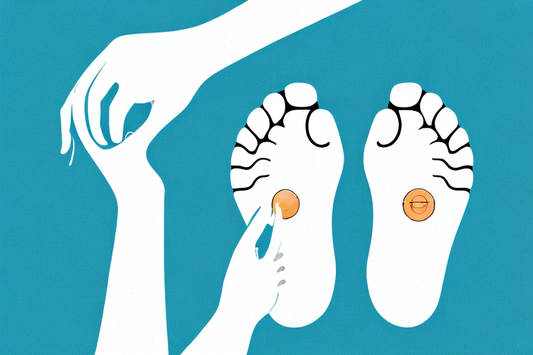
Understanding Neuropathy: Causes, Symptoms, and Treatment Options
Neuropathy is a nerve disorder that affects millions of people worldwide. It is a condition that involves damage or dysfunction to the nerves in the body, which can lead to a range of symptoms. In this article, we will explore the definition and overview of neuropathy, the different types, causes, symptoms, and treatment options.
What is Neuropathy?
Neuropathy is a disorder that affects the peripheral nervous system. This system includes all the nerves outside of the brain and spinal cord, which send and receive signals to and from the body’s organs and muscles. When the peripheral nerves are damaged or not functioning correctly, it can cause a range of symptoms throughout the body.
Definition and Overview
Neuropathy is a general term that describes damage to the nerves. This damage can occur in different parts of the nervous system and can cause a variety of symptoms. The damage can be caused by physical injury, medical conditions, infections, and toxins. It is estimated that over 20 million people in the United States alone suffer from some form of neuropathy, making it a widespread and prevalent condition.
There are many different causes of neuropathy. Some of the most common causes include diabetes, alcoholism, autoimmune disorders, infections, and exposure to toxins. In some cases, neuropathy may be caused by a combination of factors.
Neuropathy can cause a range of symptoms, depending on the type and severity of the condition. Some common symptoms include tingling, numbness, weakness, and pain in the affected areas. In severe cases, neuropathy can lead to muscle wasting, paralysis, and even organ failure.
Types of Neuropathy
There are different types of neuropathy based on the parts of the nervous system that are affected. Some common types include peripheral neuropathy, autonomic neuropathy, and cranial neuropathy. Peripheral neuropathy refers to damage to the nerves in the hands, feet, and legs. Autonomic neuropathy affects the nerves that control the body’s automatic functions, such as breathing and heart rate. Cranial neuropathy can affect the nerves that control the senses, such as sight, hearing, and smell.
Peripheral neuropathy is the most common type of neuropathy, affecting millions of people worldwide. It can be caused by a variety of factors, including diabetes, alcoholism, and exposure to toxins. Symptoms of peripheral neuropathy may include numbness, tingling, and pain in the affected areas.
Autonomic neuropathy is less common than peripheral neuropathy but can be more severe. It can affect the nerves that control the heart, blood vessels, digestive system, and other organs. Symptoms of autonomic neuropathy may include dizziness, fainting, and difficulty regulating blood pressure.
Cranial neuropathy is a rare type of neuropathy that affects the nerves that control the senses. It can cause a range of symptoms, including double vision, loss of vision, and difficulty speaking or swallowing.
Prevalence and Demographics
Neuropathy is a prevalent condition, affecting people of all ages, genders, and ethnicities. However, some groups are at a higher risk of developing neuropathy, such as those over 60 years of age, individuals with diabetes, people with a family history of neuropathy, and those who have undergone chemotherapy or radiation therapy.
Diabetes is one of the most common causes of neuropathy, affecting up to 50% of people with the condition. Other medical conditions that can increase the risk of neuropathy include kidney disease, liver disease, and autoimmune disorders.
Overall, neuropathy is a complex and challenging condition that can have a significant impact on a person’s quality of life. However, with proper diagnosis and treatment, many people are able to manage their symptoms and lead fulfilling lives.
Causes of Neuropathy
Neuropathy is a condition that affects the nerves, causing symptoms like pain, numbness, and tingling. There are various causes of neuropathy, including underlying medical conditions, injuries, trauma, and exposure to toxins.
Diabetes and Neuropathy
Diabetes is one of the primary causes of neuropathy, with up to 50% of people with diabetes experiencing symptoms of nerve damage. The high blood sugar levels associated with diabetes can damage the nerves throughout the body, leading to symptoms such as pain, numbness, and tingling in the hands and feet.
It is important for individuals with diabetes to manage their blood sugar levels to prevent the development of neuropathy. This can be done through lifestyle changes, such as diet and exercise, as well as medication management.
Autoimmune Diseases
Autoimmune diseases, such as lupus and rheumatoid arthritis, can also cause neuropathy. These conditions occur when the body's immune system mistakenly attacks its tissues, leading to inflammation and damage to the nerves.
Treatment for autoimmune diseases may involve medications to suppress the immune system and reduce inflammation, as well as lifestyle changes to manage symptoms.
Infections and Viruses
Infections and viruses, such as HIV, hepatitis C, and herpes, can also cause neuropathy. These conditions can damage the nerves directly or indirectly by causing inflammation in the body.
Prevention of infections and viruses is key to reducing the risk of developing neuropathy. This can be done through practicing good hygiene, getting vaccinated, and avoiding contact with infected individuals.
Vitamin Deficiencies
Vitamin deficiencies, particularly of B vitamins, can cause neuropathy. These vitamins are essential for nerve health and function. Lack of vitamins can lead to nerve damage and the development of neuropathic symptoms.
Individuals who are at risk for vitamin deficiencies, such as those who follow restrictive diets or have malabsorption disorders, should consider taking supplements to prevent the development of neuropathy.
Hereditary Factors
Neuropathy can also be caused by hereditary factors. Individuals with a family history of neuropathy may have a higher risk of developing the condition.
It is important for individuals with a family history of neuropathy to discuss their risk with their healthcare provider and take steps to prevent the development of the condition.
Medications and Toxins
Some medications and toxins can cause nerve damage and lead to neuropathy. For example, chemotherapy drugs used to treat cancer can cause nerve damage as a side effect. Exposure to toxins like heavy metals and pesticides can also lead to nerve damage and neuropathic symptoms.
Individuals who are exposed to toxins in their workplace or environment should take steps to reduce their exposure and wear protective equipment to prevent the development of neuropathy.
Trauma and Injuries
Physical trauma or injuries can also cause neuropathy. For example, a car accident or sports injury can damage the nerves and lead to symptoms like numbness, tingling, and weakness.
Prevention of injuries is key to reducing the risk of developing neuropathy. This can be done through practicing safe behaviors, such as wearing seatbelts and protective gear during sports activities.
Symptoms of Neuropathy
The symptoms of neuropathy can vary, depending on the type of neuropathy and the affected nerves. However, some common symptoms include:
Sensory Symptoms
Sensory symptoms associated with neuropathy can include numbness, tingling, and burning sensations in the hands, feet, or other parts of the body. Patients may also experience heightened sensitivity to touch, temperature, and pain.
For example, a patient with diabetic neuropathy may experience numbness in their feet, making it difficult for them to feel pain or injury. This can lead to unnoticed foot injuries and infections, which can ultimately result in amputation.
Similarly, a patient with chemotherapy-induced neuropathy may experience tingling and burning sensations in their hands and feet, making it difficult to perform everyday tasks like buttoning a shirt or holding a pen.
Motor Symptoms
Motor symptoms of neuropathy can include weakness, muscle wasting, and paralysis. These symptoms can affect the ability to move and control muscles in the body.
For example, a patient with motor neuropathy may experience weakness in their legs, making it difficult to walk or stand for extended periods of time. This can lead to a decrease in mobility and an increased risk of falls.
In some cases, motor neuropathy can also affect the muscles responsible for breathing, leading to respiratory failure and the need for mechanical ventilation.
Autonomic Symptoms
Autonomic symptoms of neuropathy can affect the automatic functions of the body, such as digestion, bladder control, and blood pressure. Patients may experience symptoms like constipation, diarrhea, urinary incontinence, or rapid heart rate.
For example, a patient with autonomic neuropathy may experience constipation and bloating due to slowed digestion. They may also experience urinary incontinence due to weakened bladder muscles.
In severe cases, autonomic neuropathy can lead to dangerous drops in blood pressure, which can cause dizziness, fainting, and even death.
Progression and Severity
The progression and severity of neuropathy can also vary. In some cases, symptoms may be mild and easily managed, while in others, they may be severe and debilitating.
Early diagnosis and treatment are crucial in preventing the progression of neuropathy. Treatment options may include medications, physical therapy, and lifestyle changes.
Without proper treatment, neuropathy can ultimately lead to permanent nerve damage and loss of function. It is important for patients to speak with their healthcare provider if they are experiencing any symptoms of neuropathy.
Treatment Options for Neuropathy
Treatment for neuropathy depends on the underlying cause and the severity of symptoms. Some common treatment options include:
- Medications to alleviate pain and other symptoms
- Physical therapy to improve muscle strength and movement
- Surgery to release pressure on nerves in severe cases
- Lifestyle changes, such as improving diet and exercise habits, quitting smoking, and reducing alcohol intake
- Alternative therapies like acupuncture, massage, or meditation
It is essential to seek medical attention promptly if experiencing symptoms of neuropathy. With proper diagnosis and treatment, patients can manage symptoms and reduce the risk of further nerve damage and complications.
Conclusion
Neuropathy is a widespread and prevalent condition that affects millions of people worldwide. It can be caused by various underlying medical conditions, injuries, and exposure to toxins. Symptoms can vary, but they typically involve sensory, motor, or autonomic dysfunction. With the right diagnosis and treatment, individuals with neuropathy can manage symptoms and improve their quality of life.




